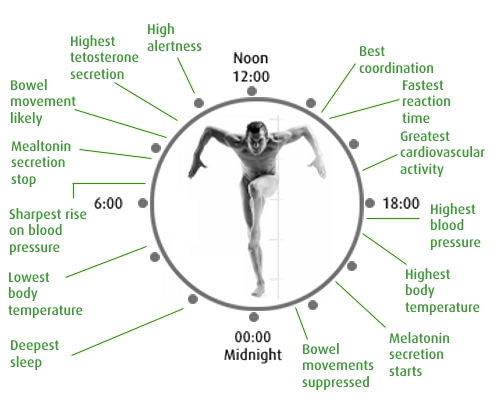A.Vogel search
When the internal search is activated, personal data such as your IP address is transmitted to our search engine Cludo. Data is thus transferred to a third country. Please click here if you want to display the internal search. You can find more information on data protection here: Privacy policy.Biological clock
Our body follows circadian rhythms on a 24-hour cycle, where biochemical, physiological and behavioral processes take place.
Different organisms (plants, animals, bacteria, etc.) have evolved since the dawn of time to synchronize their activities with the day-night cycle caused by the Earth's rotation.
Our body follows circadian rhythms on a 24-hour cycle, where biochemical, physiological and behavioral processes take place. These rhythms can be influenced by our environment; especially by light.
These rhythms are controlled by our biological clock which is located in the middle of the brain at the base of the hypothalamus. Besides the main biological clock, our body also has other peripheral clocks which are found in several organs such as the esophagus, lung, liver, heart, pancreas, spleen, thymus and the skin.
The main biological clock acts as the “central controller”, which transmits to peripheral clocks - on a regular base - electrical signals to adjust their functioning.
For example, the information regarding time of the day (light or dark periods) as relayed by the eye travels to the master biological clock, and through that, the clocks in the rest of the body may be synchronized. This explains how the timing of sleep/wake, appetite or body temperature is coordinated by the biological clock.

This graphic illustrates the circadian patterns typical of someone who rises early in morning, eats lunch around noon and goes to sleep at 10 pm.
Although circadian rhythms tend to be synchronized with cycles of light and dark, other factors such as ambient temperature, meal times, napping schedule and duration and stress and exercise can also influence the timing as well.
With today’s flights, the transitions between time zones are so rapid that the change in the light-dark cycle (cycle of 12 h light/12 h darkness) is too great for the biological clock to entrain to immediately. This results in a disparity between the external and internal rhythms. Click here to learn more about Jetlag
A sleep diary is a record of an individual's sleeping and waking times with related information, usually over a period of several weeks.
In addition to being a useful tool for health care practitioners in the diagnosis of sleep problems, a sleep diary can help make individuals more aware of the parameters affecting their sleep.
This data alone can help people pin point factors favouring good sleep.
A.Vogel Blog – Natural and Healthy
Inspiration for a healthy life!




